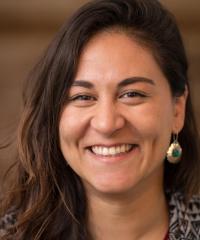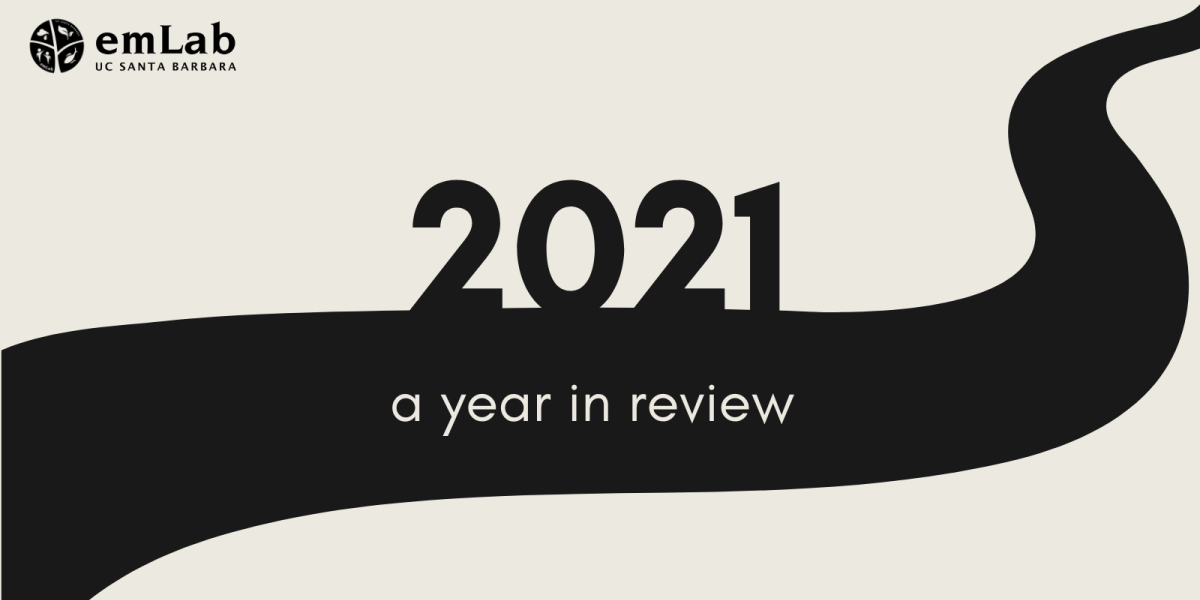
If 2020 was the year of stagnation and stay-at-home orders, then 2021 has been a year of flux for us here at emLab. The uncertainty that comes with navigating the fallout of a global pandemic has presented a unique set of challenges for our team, but we are proud of the continued perseverance, dedication, and empathy demonstrated by all, in spite of these (protracted!) unpredictable times. We want to take a moment to celebrate our resilience by sharing a few of our favorite accomplishments from this past year:
Innovative Insights
emLab is dedicated to pioneering new research approaches and generating original and academically rigorous scientific findings, and we managed to generate a number of exciting insights this year:
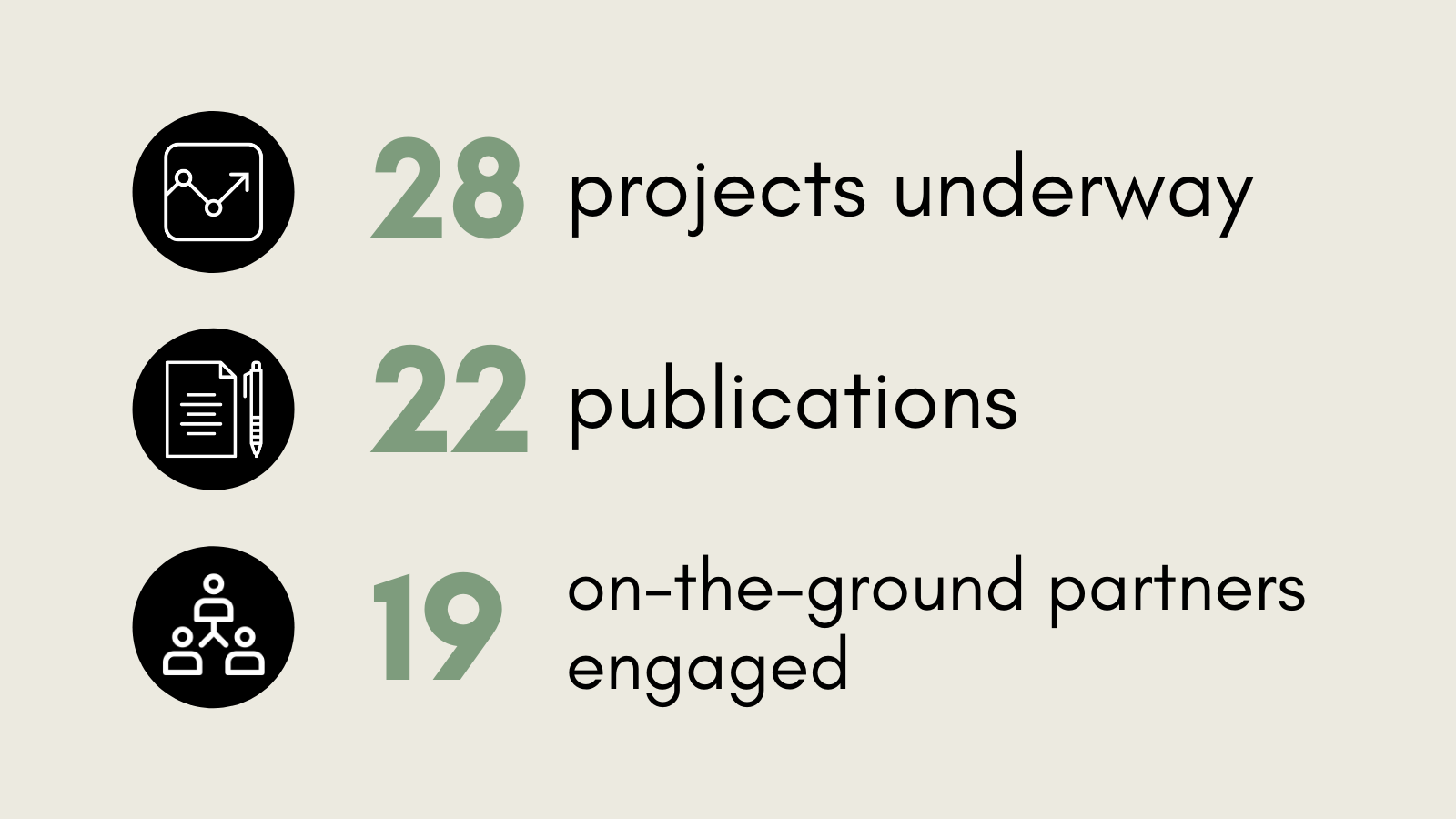
But those aren’t the only exciting numbers we produced in 2021! Here’s a snapshot of key figures from some of our projects:
- 9 - The number of steps identified by our Cell-based Seafood team that must occur for cell-based seafood to effectively reduce fishing pressure on wild-caught fish. Cell-based seafood, or fish protein grown in a bioreactor using cell samples from a fish, is a novel food product, developed with the goal of reducing the environmental impact of the fishing industry and delivering conservation benefits. Alongside our collaborators at the National Center for Ecological Analysis and Synthesis, we examined the potential of achieving this goal, and found that the path to fisheries recovery and collateral ocean benefits is long, narrow, and unlikely to result from cell-based seafood technology.
- 2,500 - The estimated number of potential fatalities that could be avoided in California between 2019 and 2045 if decarbonization policies are enacted for oil and gas refineries. The production and use of fossil fuels for transportation in California contributes to roughly half of the State's total carbon emissions, making the sector a crucial target for emissions reductions if California is to meet its goal of reaching carbon neutrality by 2045. We worked with the California Environmental Protection Agency, UC Davis’ Institute of Transportation Studies, and interdepartmental partners here at UC Santa Barbara to identify equitable pathways to reach carbon neutrality in California’s transportation sector.
- 70% - The percent of households in Ghana that cook using burning biomass. The resulting household air pollution from burning wood, charcoal, and crop residue in open fires has severe impacts on human health. To address these health concerns, we are working on a project aimed at increasing community-wide adoption of clean cooking technologies to help reduce household air pollution. In partnership with collaborators at Columbia University and the Kintampo Health Research Centre, we are conducting a series of assessments on community needs, behaviors, alternative energy sources, and air quality to determine the most effective method of encouraging the adoption of clean cooking technology.
- 14%–23% - The increased likelihood of a wildfire growing larger than one acre if it occurs on inaccessible land. The western US is known for playing host to the vast majority of public lands in the country, but approximately 6 million acres of public land in the West is “stranded,” or inaccessible to the public. Land can become stranded through a lack of roads or other means of access and being completely surrounded by private land. We’ve been working with partners at Arizona State University, Resources for the Future, and the US Forest Service to examine the localized impacts of these stranded public lands. Key impacts we’ve identified thus far include: negative effects on local economies, contribution to larger wildfires, and hindering the movement of wildlife.
- 6 - The number of new projects we launched this year under the umbrella of our new cross-cutting research initiative with Conservation International: The Arnhold UCSB-CI Climate Solutions Collaborative. This initiative is aimed at developing solutions to bolster resilience to climate change, mitigate climate impacts, catalyze innovation, and foster the next generation of environmental leaders. Research on the key areas of resilience, mitigation, and adaptation is already underway - stay tuned for new findings!
Communications
We use strategic science communication to get the word out about timely and implementable solutions - just one of the many tactics we leverage to fulfill our commitment to real-world impact:
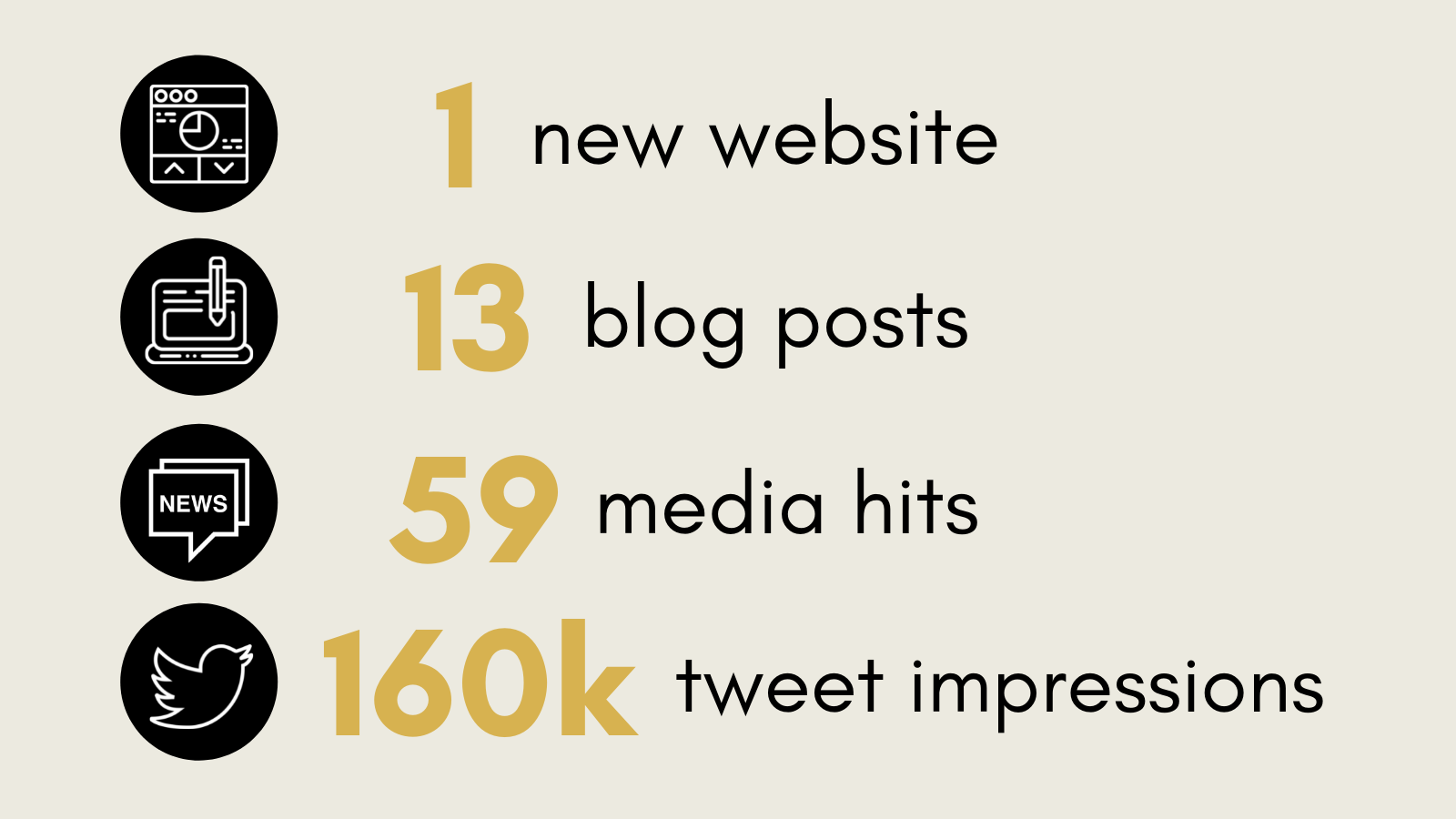
We stepped up our science communications efforts this year with the launch of our new website and the recruitment of two fantastic undergraduate interns who have helped to refresh our presence on social media. One medium that we use to share our research and connect our work to relevant current events and discourse is through our “Our 2 Cents” blog series. If you haven’t already, check out our most-read blog of 2021: “3 misconceptions about carbon pricing.”
Community
We aim to foster a vibrant and diverse intellectual community that generates novel insights and inspires collaborative development and testing of new ideas. This year we expanded our community by hosting early-career researchers and providing diverse opportunities for student involvement:
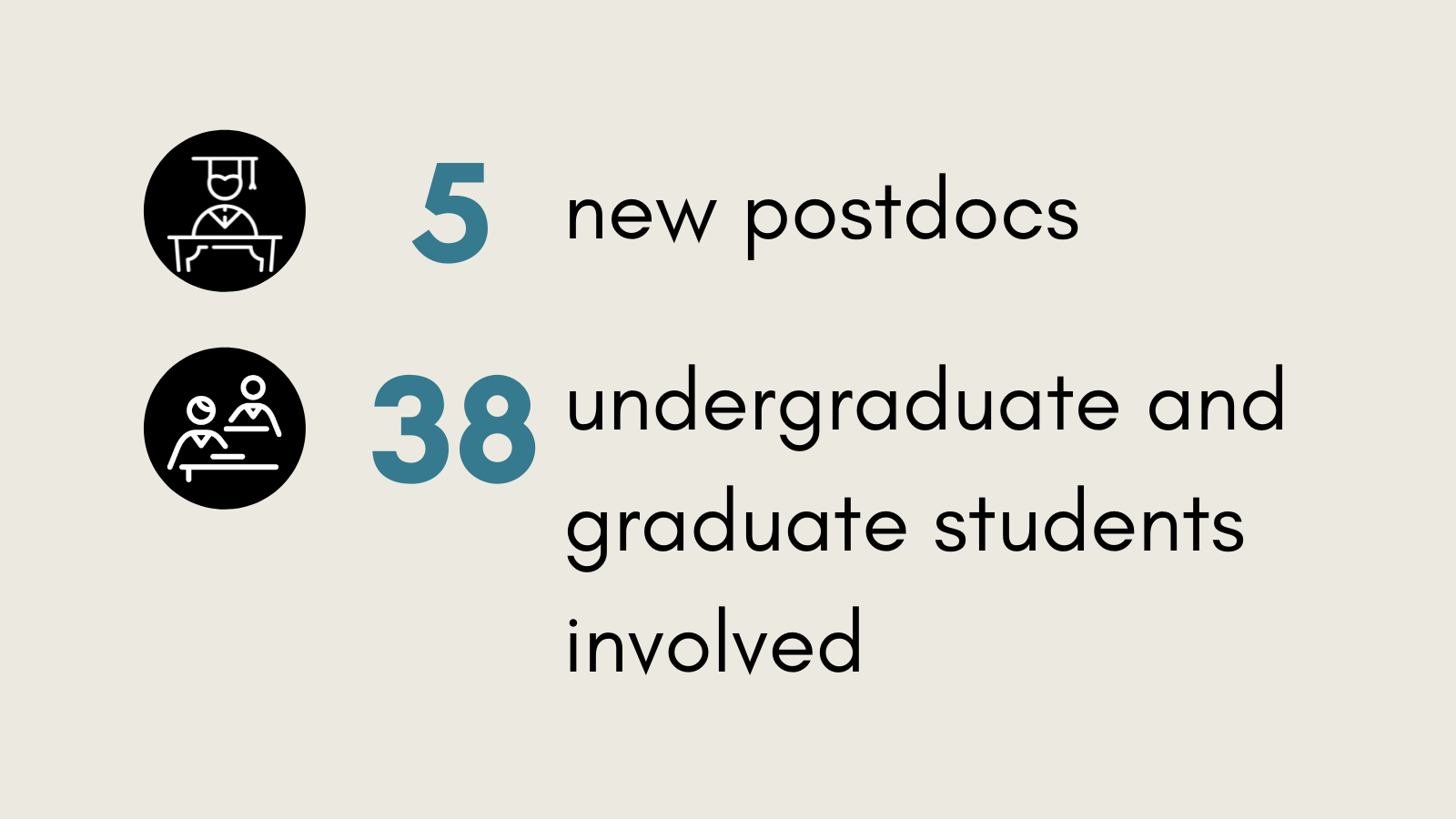
Our research benefits from the many fruitful relationships that we’ve built with peers and colleagues from around the world, and we strive to give back to the academic community by mentoring a new generation of scientists whose diverse life experiences, interests, and talents will help to create a more innovative and inclusive academia. We also made strides toward a more open and transparent scientific community with the creation of the emLab manual, which serves as an overview of who we are and sets expectations and provides resources on how we work.
Looking forward
At emLab, we embrace an attitude of ambitious possibility - so we would be remiss not to mention a few of the many exciting opportunities that we are looking forward to in 2022!
This spring, we will be hosting an interdisciplinary workshop on environmental justice and policy, where we will be convening experts in environmental justice (EJ), policy, and economics to collaboratively identify important research questions at the intersection of environmental justice and environmental policy. We are excited and humbled to exchange ideas with renowned experts in the EJ space and look forward to the beginnings of what we hope will be a long-term collaboration!
We are also looking forward to expanding our portfolio of natural climate solutions (NCS) research in the new year. NCS was a key point of discussion at COP26, and several of our new and upcoming projects are focused on informing the effective design and deployment of NCS. Through the Climate Solutions Collaborative, we are working to improve NCS impact evaluation by developing a framework to rigorously compare the effectiveness of different natural climate solutions and by integrating remote sensing into randomized controlled trials (RCTs) to enhance our ability to assess the effectiveness of NCS. We will also be launching a new project in partnership with the Environmental Defense Fund and Princeton University’s Carbon Mitigation Initiative to examine variation in responses to market incentives designed to encourage a variety of land-based climate solutions (LBCS), such as reduced deforestation, increased afforestation, or enhanced soil carbon sequestration through changes in agricultural practices.
2022 will be a year for exploring innovation in the marine resource space as well - we recently held an energetic brainstorming session in which we discussed what we think “The Next Big Thing” in ocean and fisheries will be - stay tuned to see what we come up with!
If we have learned anything from this year, it’s how to roll with the punches and be comfortable living in a state of flux. In spite of the uncertainty surrounding what the future holds for all of us, we are grounded in the present through gratitude for our team members, supporters, and partners for their continued adaptability and tenacity over this past year. There is one thing that we can be certain of, and it is that we intend to continue conducting innovative, collaborative, solutions-oriented research to drive environmental and social good for all.
